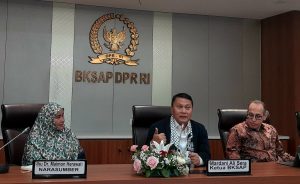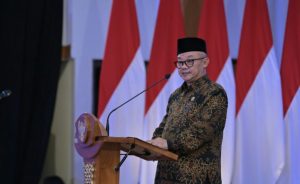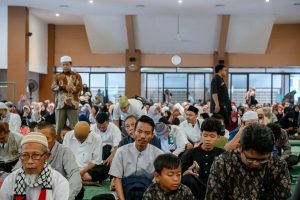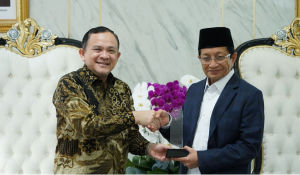maid-Erwiana-Sulistyaningsih-during-a-protest-in-Hong-Kong-300x200.jpg" alt="Domestic helpers and their supporters shout slogans while holding pictures of Indonesian maid Erwiana Sulistyaningsih during a protest in Hong Kong" width="300" height="200" /> Domestic helpers and supporters shout slogans while holding pictures of maid Erwiana Sulistyaningsih during a protest in Hong Kong
London, 06 Jumadl Akhir 1437/16 March 2016 (MINA) – One in six migrant domestic workers in Hong Kong is a victim of forced labour and a significant proportion have been trafficked, rights campaigners said on Tuesday (Mar 15) as they called for stronger protection for the city’s maids.
Research by the Justice Centre Hong Kong suggests that more than 80 per cent of the territory’s 336,600 domestic workers are exploited, with some working 20 hours a day, Mi’raj Islamic News Agency (MINA) reported, quoting CNA.
“Hong Kong must come clean; the government can no longer afford to simply sweep these problems under the carpet,” the centre said in a report.
The treatment faced by the city’s domestic helpers made international headlines last year when a Hong Kong mother was sentenced to six years in prison for repeatedly abusing and assaulting her maids.
Also Read: Jordanian YouTuber Joe Hattab Arrives in Kuansing to Witness Pacu Jalur
Another Hong Kong couple was jailed in 2013 for torturing their maid, who said they once dressed her in a nappy and tied her to a chair while they went on holiday.
The Justice Centre said the Hong Kong government often treated such cases as isolated incidents, but campaigners believe they are symptomatic of widespread exploitation.
A third of Hong Kong households with children employs a maid. The majority are from the Philippines and Indonesia.
The study found that they work an average of over 70 hours a week, yet only a fraction reported receiving above the minimum monthly wage, which recently rose to HK$4,210 ($543).
Also Read: BKSAP Establishes Indonesia-Palestine Friendship Society
Passports confiscated
The study surveyed more than 1,000 domestic workers from eight countries about their recruitment, pay, work conditions and treatment.
It said Indonesians are the most vulnerable, and 70 per cent are more likely to be in forced labour than others.
“If you extrapolate the findings, there’s potentially over 50,000 domestic workers in Hong Kong that are in a situation of forced labour,” said Justice Centre’s advocate Victoria Wisniewski Otero. “What really surprised me in particular, was just how big of a role recruitment debt seems to have on determining whether someone was likely to be in forced labour.”
Also Read: Dutch Hiker Evacuated by Helicopter After Fall on Mount Rinjani
The authors said contrary to what many people think, forced labour and trafficking “don’t always take place in shackles and in the shadows”.
They highlighted the case of Indah, an Indonesian maid who was hired legally and receives the minimum wage, but is still a victim of forced labour.
Indah, who has had her passport confiscated, works 20 hours a day. Her employer often wakes her at night to work and forces her to work for other people and on her day off.
In a separate case, domestic helper Alwati told Channel NewsAsia that she had to help out at the family’s dog kennel business on top of her daily chores. The Indonesian had landed the job in Hong Kong after two stints in Singapore.
Also Read: Islamic Boarding School in Tasikmalaya Stage Theatrical Performance to Voice Support for Palestine
She worked 16-hour days, but did not complain as she did not want to break the employment contract. However, the last straw came when she was seriously bitten three times and had to see a doctor.
“Migrant domestic workers are uniquely vulnerable to forced labour because the nature of their occupation can blur work-life boundaries and isolate them behind closed doors,” the report said.
The Justice Centre urged the government to create clear guidelines on working hours and abolish the requirement for maids to “live in”, which it said increased the risk of exploitation.
A rule requiring migrant workers to leave Hong Kong within two weeks of their contract ending should also be scrapped as this leaves them scared to report abuse, the centre added.
Also Read: 100 Boats to Compete in Pacu Jalur Boat Race in Kuantan Singingi
Like Indah, almost all those in forced labour had attained at least secondary school education and more than a quarter had attended college or university.
Over a third of all domestic workers surveyed were not given a full day off as required by law, over half reported receiving less than the minimum food allowance and nearly a third did not feel free to quit.
The centre also called for tougher action on unscrupulous employment agencies that overcharge migrant workers, often leaving them in debt. More than a third of respondents said that their recruitment fee debt was excessive, at more than 30 per cent of their total wages. (T/R07/R01)
Mi’raj Islamic News Agency (MINA)
Also Read: Indonesian Guide Association Holds Workshop on Personal Branding and Cultural Literacy













![Activists drop a banner from Westminster Bridge, calling on Labor leader Keir Starmer to say he'll end arms sales to Israel if he becomes prime minister, on 3 June 2024, in London, Uk [Luca Marino]](https://en.minanews.net/wp-content/uploads/2024/08/IMG_20240825_103542-300x190.jpg)






















 Mina Indonesia
Mina Indonesia Mina Arabic
Mina Arabic